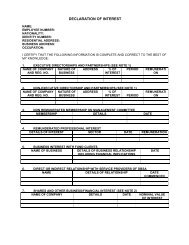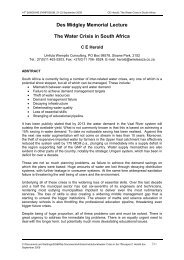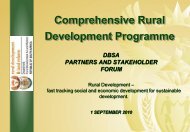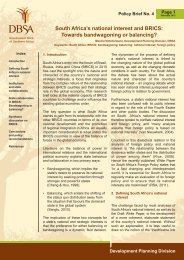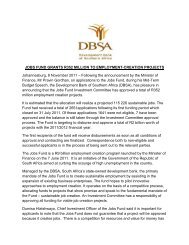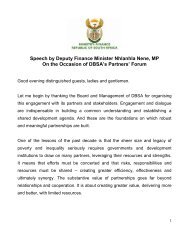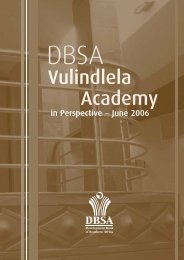A Knowledge Strategy
A Knowledge Strategy
A Knowledge Strategy
You also want an ePaper? Increase the reach of your titles
YUMPU automatically turns print PDFs into web optimized ePapers that Google loves.
4.4.4 Embedding the knowledge management process<br />
The knowledge management process will be embedded through the:<br />
• approval of the business plan by the KM-STRAT;<br />
• implementation of the business plan by the executive and unit managers;<br />
• management of knowledge management-related performance through the BSC<br />
and the IRR system; and<br />
• integration and monitoring of the progress of the Phase One Pilot by the<br />
<strong>Knowledge</strong> Management Project.<br />
4.5 Functional roles and forums<br />
The <strong>Knowledge</strong> Management Cluster has been mandated to initiate and pilot the<br />
business plan and implementation. This entails enhancing the knowledge<br />
management process by providing infrastructure, solutions and skills to pilot<br />
interventions; facilitation, expertise, participation, performance and recognition<br />
systems and change management support to the process; and, organisational and<br />
unit measures for the process.<br />
The Operations Cluster and organisational clusters should enhance the<br />
knowledge management as described earlier while unit managers are accountable<br />
for managing and delivery.<br />
4.5.1 <strong>Knowledge</strong> Management Cluster<br />
The Executive Manager of the <strong>Knowledge</strong> Management Cluster continues to<br />
provide guidance for knowledge management initiatives via the KMC bi-weekly,<br />
the KM-STRAT and Executive Commitee (Exco) and Board of Directors forums.<br />
4.5.2 Operations Cluster and organisational clusters<br />
Operations and organisational clusters should implement the knowledge<br />
management process through the various forums of approval, such as the<br />
Operations Committee, Exco and meetings of the Board.<br />
4.5.3 Cross-functional and clusters approval<br />
Aspects of the knowledge management process that are related to the <strong>Knowledge</strong><br />
Management Cluster or the accountability of operations should be referred to the<br />
relevant cluster and executive forums for approval or notification.<br />
4.6 Risks<br />
The greatest risks faced in effective institutionalisation are that the organisational<br />
culture, climate and business processes do not support cross-functional<br />
collaboration – a foundational requirement for effective knowledge management –<br />
and poor ownership.<br />
The business plan makes five recommendations that, if vigilantly adhered to,<br />
should mitigate these risks. However, if any one of these recommendations is<br />
ignored, the effective institutionalisation of knowledge management will be<br />
compromised. The five recommendations are that the:<br />
38 Development Bank of Southern Africa



